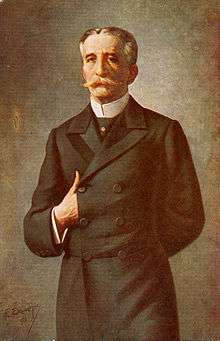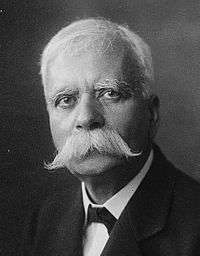1902 Greek legislative election
Parliamentary elections were held in Greece on 17 November 1902.[1] Supporters of Theodoros Deligiannis emerged as the largest bloc in Parliament, with 110 of the 235 seats.[2] Deligiannis became Prime Minister for the fourth time on 6 December.[3]
| |||||||||||||||||||||||||||||
All 235 seats of the Greek Parliament 118 seats needed for a majority | |||||||||||||||||||||||||||||
|---|---|---|---|---|---|---|---|---|---|---|---|---|---|---|---|---|---|---|---|---|---|---|---|---|---|---|---|---|---|
| |||||||||||||||||||||||||||||
| |||||||||||||||||||||||||||||
| This article is part of a series on |
| Politics of Greece |
|---|
 |
|
Judiciary
|
|
|
|
Results
| Party | Votes | % | Seats |
|---|---|---|---|
| Supporters of Theodoros Deligiannis | 110 | ||
| Supporters of Georgios Theotokis | 70 | ||
| Supporters of Alexandros Zaimis | 30 | ||
| Supporters of Leonidas Deligiorgis | 10 | ||
| Supporters of Stephanos Dragoumis | 4 | ||
| Independents | 11 | ||
| Total | 235 | ||
| Source: Nohlen & Stöver | |||
gollark: 99% of people get this MATHS QUESTION™ wrong!What comes next in the following sequence:1, 2, 3, ...
gollark: Oh, sure.
gollark: So it would just have to pick a random extra point.
gollark: Well, it's deterministic given the same inputs.
gollark: It's just an implementation of Langrange interpolation, which is simple enough that I could implement it in about 15 lines of JS based on Wikipedia.
References
- Dieter Nohlen & Philip Stöver (2010) Elections in Europe: A data handbook, p829 ISBN 978-3-8329-5609-7
- Nohlen & Stöver, p855
- Nohlen & Stöver, p867
This article is issued from Wikipedia. The text is licensed under Creative Commons - Attribution - Sharealike. Additional terms may apply for the media files.

